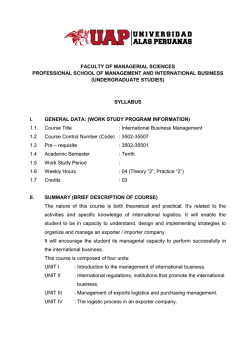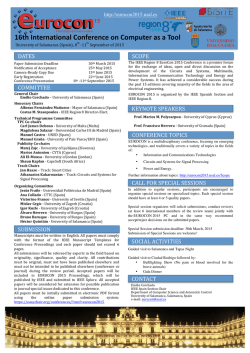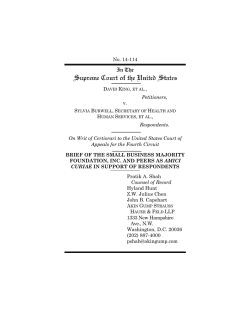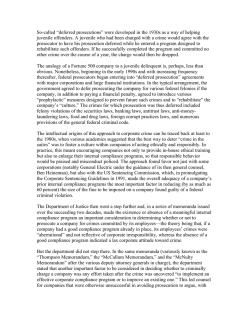
Competition Law Review Table of Contents
_._-----
European Competition Law
2015 Volume 36 Issue 2
ISSN: 0144-3054
Review
Table of Contents
Articles
GRANT MURRA Y
In search of the obvious: Groupement des Cartes Bancaires and "By Object"
infringements under EU competition law 47
GCB is a landmark judgment, applying the brakes to an expansive approach to when a restrietion is
anti-competitive "by object". This artiele considers the th ree key lessons arising out of the judgment
and the practical implications for companies. It concludes that the Commission must revert to a more
visceral test based on experience which confines the serious consequences ofa "by object" classification
to "obvious" cases.
The Competition and Consumer Proteetion Act 2014: A new era for Irish
Competition Law 52
GORDONWADE
The lrish competition regime has been praised around the world and now, with the passing of the
Competition and Consumer Proteetion Act 2014, can be considered to punch weil above its weight in
terms of its influence on competition law and practice. All businesses involved with mergers and
acquisitions in lreland will do weil to familiarise themselves with the Act and prepare for its changes.
SASCHA HINDMARCH
BROOKES
AND AIMEE
ANA CACHO LACARRA, YlJIA TU AND
HANNA STAKHEYEVA
PROFESSOR
VALERlA FALCE
Sky Blue Sports: A UK Perspective on State Aid
56
This artiele focuses upon State aid, its features and the test to be applied by European National Courts.
In particular, it examines the recent UK judgment of R (Sky Blue Sports & Leisure) v Covenlry City
Council ("Sky Blue Sports")-in
which consideration was given by a UK Court as to wh ether a public
authority's actions constituted unlawful State aid.
Information Exchanges in the EU and China: Assessment and Precedents
62
Information sharing and exchange platforms (normally run by third parties) have become a popular
trend nowadays. lrrespective of certain efficiencies to the market players, agreements to exchange
information can, in certain circumstances, amount to restrictive agreements or concerted practices that
may be in violation of Competition Law. Recognizing the increasing importance of China in the world
economyand in anti trust enforcement, and taking into account that it has no precise policy on information
exchanges for the moment, the artiele focuses on the legal framework for information exchanges,
concerted actions/agreements in the EU and China, and analyses the existing rules, and precedents in
relation to information exchanges between undertakings in these jurisdictions, primarily focusing on
those information exchanges that are run by third parties for benchmarking purposes.
Abuse of Economie Dependenee and Competition Law Remedies: A sound
interpretation of the Italian Regulation
71
The Ttalian regulation against the abuse of economie dependenee has been recently strengthened with
the view to combat late payment in commercial transactions through the competition law enforcement.
In particular, anti trust actions and remedies have been made available within business-to-business
relations any time a consistent late payment issue arises. Despite the objective justifications underlying
the reform, its features may lead to unwilling consequences which will be analysed in the following
article, together with a proposal to interpret the new law consistently with the Italian con su mer policy
and competition law.
PAUL DOBSON AND RATULA
CHAKRA BORTY
Assessing Brand and Private Label Competition
76
Competition between branded and private label goods involves a mix of horizontal and vertical aspects
which have important implications for assessing competition and market definition in FMCG markets.
We explain why considerable care is needed in applying and interpreting the usual assessment tests
because ofhow retailers control the pricing and positioning of these products.
SUrYlZHA
G
How have netwenk effects affected the European Commission's enforcement
of competition law in technology enabled markets?
82
Enforcement against supposedly anti-compcritive conduct on technology enabled markets has become
an inereasingly important and controversial part of the European Commission 's activities. There has
been much discussion on whether enforcement agencies should adopt special approaches to the unique
features of technology enabled markets. This piece aims to analyse how one important fearure of these
markets-that
is, network effects, have affected the European Commission's approach to technology
enabled markets through the lens ofthe string of Microsoft cases. It looks at the Commission's concerns
about network effects in the Microsoft tying and refusal to deal cases. It questions whether the
Commissicn's concerns are justified, and explores the implications ofthe Commission changing this
approach in its assessment ofthe Microsoft and Skype rnerger. Ultimately it argues that the Commission's
failure to formulatc a consistent and coherent approach to assessing how network effects affect competition
in the context of rapidly evolving markets with epherneral dominanee has serious irnplications for the
Commissicn's ability to en force competition law in furure cases where network effects arise.
Book Review
DR ALEXANDR
SVETLICINII
Competition Law and Standard Essential Patents: A Transatlantic
Perspective
93
National Reports
Czech Republic
ABUSE OF DOMINANT
Bus services
-11
POSITION
Denmark
ANTI-COMPETITIVE
Used car sales N-12
AGREEMENTS
Denmark
ANTI-COMPETITIVE
Construction
N-12
AGREEMENTS
Denmark
ANTI-COMPETITIVE AGREEMENTS
Hairdressing salons N-12
Finland
A TI-COMPETITIVE AGREEMENTS
Power transmission
N-13
Germany
PRIVATE ENFORCEMENT
Jointly and severally imposed EU cartel fine
Slovenia
ABUSE OF DOMINANT POSITION
Copyright collection agency N-14
Spain
MERGERS
Opthalmic lenses
Spain
PROCEDURE
Bid-rigging
N-15
Spain
PROCEDURE
lnsurance services
Spain
PROCEDURE
Infringement
-15
-16
N-17
Spain
ANTI-COMPETITIVE AGREEMENTS
Paper envelopes
N-17
Sweden
ANTI-COMPETITIVE
Bankers' Association
AGREEMENTS
N-18
Switzerland
ANTI-COMPETITIVE
Builders' associations
AGREEMENTS
N-18
-13
ANTI-COMPETITIVE
PRACTICES
Retail banking services N-19
© Copyright 2026











